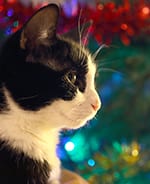Holiday Pet Safety
How to Prevent a Pet Emergency This Holiday Season

Some of the most common holiday pet emergencies involve them ingesting toxic foods or decorations that can cause choking and intestinal obstruction. While it isn’t pleasant to think about the potential disasters that might take place, it is important to plan ahead and be able to identify what foods and other items can increase your pet’s risk of illness or injury. By minimizing these risks, you increase your pet’s safety (and your peace of mind).
Be sure to call us right away if you have questions relating to pet safety, and don’t hesitate to bring in your pet if you suspect they’ve ingested something harmful. When you need us, we’ll be here!
Foods That Can Harm Your Pet
The following foods should be off-limits to your pet, no exceptions:
- Meat bones – In addition to causing chipped or broken teeth, meat bones can also cause choking, and splinter into sharp pieces, injuring the mouth, esophagus, stomach, and/or intestines. They can also cause a blockage, which can be fatal if not treated immediately.
- Garlic, onions, shallots, leeks, and chives – In any form, these veggies pose a danger to your pet if ingested. They contain chemicals that can break down your pet’s red blood cells, which results in anemia.
- A variety of chocolate, from milk chocolate to baker’s chocolate and cocoa powder – The darker and more bitter the chocolate, the higher the concentration of theobromine, a chemical similar to caffeine that can cause muscle tremors, heartbeat irregularities, and other issues.
- Grapes/raisins/currants – Ingesting these fruits can send your pet into kidney failure, which in some cases can be fatal.
- Xylitol – This sugar substitute is used in all kinds of treats, from candy to baked goods. Hypoglycemia (low blood sugar) may occur if your pet consumes food containing xylitol. In more serious cases, it can also be fatal.
- Macadamia nuts, walnuts, and pecans – Nuts are high in fat, but they can also cause depression, weakness, and vomiting if your pet eats too many.
- Yeast – Uncooked bread dough that contains yeast may cause your pet’s stomach to dilate and put pressure on their surrounding internal organs. Difficulty breathing and lack of oxygen going to the major organs can be deadly.
While we sincerely hope your pet never find himself/herself in need of any of these services, when you need us, we’ll be here.
Decorations to Be Careful With
- Prevent your Christmas tree from being knocked over by placing it in a safe corner or a room that can be closed off from your pet when you’re not around. Invest in a heavy-duty tree stand for good measure.
- Candles are a big risk even for homes that don’t have pets. Try using flameless candles instead; they provide the beauty of a flickering flame without the risk of injuring your pet or damaging the house.
- Holly, mistletoe, and Jerusalem cherry are beautiful holiday plants, but their fruit is extremely toxic to animals. Keep these plants out of your home entirely or place them high out of your pet’s reach.
- Keep strands of lights secure and up high or protected by durable tubing to prevent chewing. Chewing electrical cords can burn your pet’s mouth, and loose bulbs are a choking hazard.
- If you have delicate glass ornaments, keep them off the tree altogether or place them high and tie them to the branches so they can’t be knocked off.
- Cover the Christmas tree water, which likely contains pine needles and tree sap, both of which are toxic to dogs and cats.
- Avoid decorating with tinsel, which is easy for pets to choke on. The same can also be said for tinsel garland, flocking, and fake snow.
- Ribbon, twine, and yarn are also choking hazards. Don’t leave any of these sitting around.
